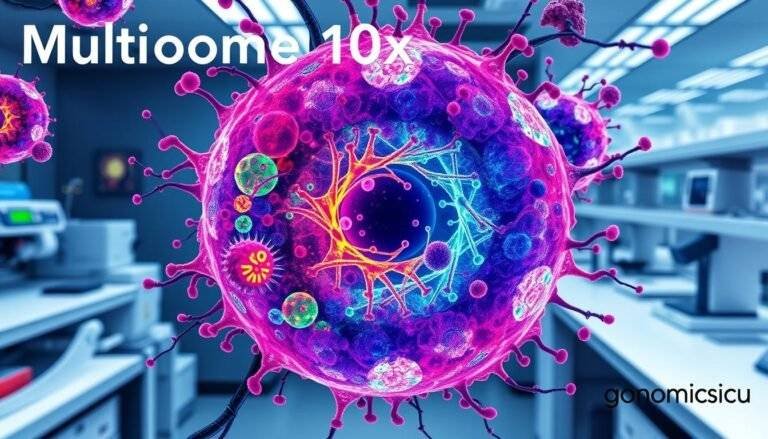Unlocking Life’s Blueprint: What Do You Mean by Genomics?
-
Table of Contents
- Understanding Genomics: What Do You Mean by Genomics?
- The Basics of Genomics: What Do You Mean by Genomics?
- Exploring Genomics: What Do You Mean by Genomics?
- Genomics Explained: What Do You Mean by Genomics?
- The Science Behind Genomics: What Do You Mean by Genomics?
- Genomics Uncovered: What Do You Mean by Genomics?
- Q&A
“Unlocking the Blueprint of Life: Exploring the Science of Genomics.”
Understanding Genomics: What Do You Mean by Genomics?
Genomics is a rapidly evolving field that has garnered significant attention in recent years, yet it remains a complex and often misunderstood area of study. At its core, genomics is the branch of molecular biology concerned with the structure, function, evolution, and mapping of genomes. A genome is the complete set of DNA within a single cell of an organism, encompassing all of its genes and non-coding sequences. Understanding genomics involves delving into the intricate details of how these genetic materials interact and influence the biological processes that sustain life.
The study of genomics extends beyond the mere sequencing of DNA. It involves analyzing the vast amounts of data generated by sequencing technologies to uncover the roles and relationships of genes within the genome. This analysis is crucial for identifying genetic variations that may contribute to diseases, understanding evolutionary relationships among species, and developing targeted therapies in medicine. The advent of high-throughput sequencing technologies has revolutionized genomics, enabling researchers to sequence entire genomes quickly and cost-effectively. This technological advancement has paved the way for large-scale genomic projects, such as the Human Genome Project, which successfully mapped the entire human genome and provided a foundational reference for further research.
In addition to its applications in medicine, genomics plays a vital role in agriculture, environmental science, and evolutionary biology. In agriculture, genomics is used to enhance crop yields, improve resistance to pests and diseases, and develop new varieties with desirable traits. By understanding the genetic makeup of plants and animals, scientists can employ selective breeding and genetic engineering techniques to optimize agricultural productivity. Similarly, in environmental science, genomics helps in monitoring biodiversity, assessing the impact of environmental changes on ecosystems, and conserving endangered species. By analyzing the genomes of various organisms, researchers can gain insights into their adaptability and resilience, informing conservation strategies.
Moreover, genomics has profound implications for personalized medicine, an emerging approach that tailors medical treatment to the individual characteristics of each patient. By analyzing a person’s genetic information, healthcare providers can predict susceptibility to certain diseases, determine the most effective treatments, and minimize adverse drug reactions. This personalized approach not only enhances the efficacy of medical interventions but also reduces healthcare costs by avoiding unnecessary treatments. As our understanding of genomics deepens, the potential for personalized medicine continues to expand, promising a future where healthcare is more precise and patient-centered.
Despite its numerous benefits, the field of genomics also raises ethical, legal, and social concerns. Issues such as genetic privacy, discrimination based on genetic information, and the potential misuse of genetic data are subjects of ongoing debate. As genomic technologies become more accessible, it is imperative to establish robust ethical guidelines and regulatory frameworks to protect individuals’ rights and ensure the responsible use of genetic information. Public engagement and education are essential in addressing these concerns, fostering a society that is informed and prepared to navigate the complexities of genomic advancements.
In conclusion, genomics is a multifaceted discipline that holds immense promise for advancing our understanding of life and improving human health. By exploring the intricate details of genomes, researchers can unlock the secrets of genetic diversity, disease mechanisms, and evolutionary processes. As we continue to unravel the mysteries of the genome, the insights gained from genomics will undoubtedly shape the future of science, medicine, and society at large.
The Basics of Genomics: What Do You Mean by Genomics?
Genomics is a field of science that focuses on the study of genomes, which are the complete set of DNA within an organism, including all of its genes. This discipline has rapidly evolved over the past few decades, driven by technological advancements and a deeper understanding of genetic material. To comprehend the essence of genomics, it is essential to first understand the fundamental building blocks of life: DNA, genes, and chromosomes. DNA, or deoxyribonucleic acid, is the molecule that carries the genetic instructions used in the growth, development, functioning, and reproduction of all known living organisms. Genes are segments of DNA that contain the instructions for making proteins, which perform most life functions. Chromosomes are structures within cells that organize and carry genes.
The study of genomics extends beyond the examination of individual genes to encompass the entire genome, which includes all of an organism’s genetic material. This holistic approach allows scientists to analyze the complex interactions between genes and their environment, as well as the influence of genetic variations on health and disease. One of the primary goals of genomics is to understand the structure, function, and evolution of genomes, which can provide insights into the biological processes that underpin life.
The advent of high-throughput sequencing technologies has revolutionized genomics by enabling researchers to sequence entire genomes quickly and cost-effectively. This technological leap has facilitated large-scale projects such as the Human Genome Project, which successfully mapped the entire human genome. Such initiatives have laid the groundwork for personalized medicine, where treatments and preventive measures can be tailored to an individual’s genetic makeup. By identifying genetic predispositions to certain diseases, genomics holds the promise of more accurate diagnoses and targeted therapies.
Moreover, genomics has significant implications for agriculture, where it is used to enhance crop yields, improve resistance to pests and diseases, and increase nutritional value. By understanding the genetic basis of these traits, scientists can develop more resilient and productive plant varieties. Similarly, in the field of conservation biology, genomics aids in the preservation of endangered species by providing insights into genetic diversity and population dynamics.
Despite its potential, genomics also raises ethical, legal, and social concerns. The ability to manipulate genetic material poses questions about privacy, consent, and the potential for genetic discrimination. As genomic data becomes increasingly accessible, it is crucial to establish frameworks that protect individuals’ rights while promoting scientific advancement. Furthermore, the interpretation of genomic data requires careful consideration, as the relationship between genes and traits is often complex and influenced by environmental factors.
In conclusion, genomics is a transformative field that offers profound insights into the genetic blueprint of life. By exploring the entirety of an organism’s genetic material, genomics provides a comprehensive understanding of biological processes and their implications for health, agriculture, and conservation. As the field continues to advance, it is imperative to address the ethical challenges it presents, ensuring that the benefits of genomics are realized in a responsible and equitable manner. Through continued research and dialogue, genomics has the potential to unlock new frontiers in science and medicine, ultimately improving the quality of life for future generations.
Exploring Genomics: What Do You Mean by Genomics?
Genomics is a rapidly evolving field that has garnered significant attention in recent years, yet its complexity often leaves many wondering what it truly encompasses. At its core, genomics is the study of genomes, which are the complete set of DNA within an organism, including all of its genes. This field extends beyond the mere sequencing of DNA to include the analysis of the structure, function, evolution, and mapping of genomes. As such, genomics provides a comprehensive understanding of the genetic blueprint that dictates the biological characteristics of living organisms.
The advent of genomics has been facilitated by technological advancements, particularly in DNA sequencing technologies. The Human Genome Project, completed in 2003, was a landmark achievement that mapped the entire human genome, setting the stage for further exploration and understanding of genetic information. This monumental project not only highlighted the potential of genomics but also underscored the complexity of genetic data, as it revealed that humans have approximately 20,000 to 25,000 genes. However, the significance of genomics extends beyond the mere identification of genes; it involves understanding how these genes interact with each other and with environmental factors to influence health and disease.
One of the most promising applications of genomics is in the field of medicine, where it has paved the way for personalized or precision medicine. By analyzing an individual’s genetic makeup, healthcare providers can tailor medical treatments to the specific genetic profile of a patient. This approach has the potential to enhance the efficacy of treatments and reduce adverse effects, as it considers the unique genetic variations that may influence an individual’s response to certain medications. Moreover, genomics has facilitated the identification of genetic markers associated with various diseases, enabling early diagnosis and intervention, which can significantly improve patient outcomes.
In addition to its medical applications, genomics plays a crucial role in agriculture, where it is used to improve crop yields and resistance to pests and diseases. By understanding the genetic basis of desirable traits, scientists can develop genetically modified organisms (GMOs) that are more resilient and productive. This has significant implications for food security, particularly in the face of a growing global population and changing climate conditions. Furthermore, genomics is instrumental in conservation biology, where it aids in the preservation of biodiversity by providing insights into the genetic diversity and evolutionary history of species.
Despite its numerous benefits, the field of genomics also raises ethical, legal, and social concerns. The potential for genetic discrimination, privacy issues related to genetic data, and the moral implications of genetic modifications are topics of ongoing debate. As genomics continues to advance, it is imperative to address these concerns through robust ethical frameworks and policies that ensure the responsible use of genetic information.
In conclusion, genomics is a multifaceted field that extends beyond the study of genes to encompass a broader understanding of the genetic and environmental factors that influence life. Its applications in medicine, agriculture, and conservation highlight its transformative potential, while also underscoring the need for careful consideration of the ethical implications it presents. As we continue to explore the depths of genomics, it is clear that this field will play an increasingly pivotal role in shaping the future of science and society.
Genomics Explained: What Do You Mean by Genomics?
Genomics is a field of science that focuses on the comprehensive study of genomes, which are the complete set of DNA within an organism, including all of its genes. This discipline has revolutionized our understanding of biology and medicine by providing insights into the genetic blueprint that dictates the structure, function, and behavior of living organisms. To fully grasp the concept of genomics, it is essential to explore its origins, methodologies, and applications, as well as its implications for the future of science and healthcare.
The term “genomics” was first coined in the 1980s, following the advent of advanced sequencing technologies that allowed scientists to decode the DNA of organisms at an unprecedented scale. Unlike genetics, which traditionally focuses on the study of individual genes and their roles in inheritance, genomics encompasses the study of all genes and their interrelationships within the genome. This holistic approach enables researchers to analyze complex biological systems and understand how various genetic components interact to influence traits and diseases.
Central to genomics is the use of high-throughput sequencing technologies, which have dramatically reduced the time and cost required to sequence entire genomes. These technologies have facilitated large-scale projects such as the Human Genome Project, which successfully mapped the entire human genome in 2003. The completion of this monumental task marked a significant milestone in genomics, providing a reference for understanding human biology and disease. Moreover, it paved the way for subsequent research into the genomes of other organisms, further expanding our knowledge of life’s diversity.
In addition to sequencing, bioinformatics plays a crucial role in genomics by providing the computational tools necessary to analyze and interpret vast amounts of genetic data. Through sophisticated algorithms and software, bioinformatics enables researchers to identify patterns, variations, and mutations within genomes, offering insights into the genetic basis of diseases and potential therapeutic targets. This integration of biology and technology exemplifies the interdisciplinary nature of genomics, which draws upon fields such as computer science, mathematics, and statistics to advance our understanding of genetics.
The applications of genomics are vast and varied, impacting numerous areas of science and medicine. In healthcare, genomics has led to the development of personalized medicine, where treatments are tailored to an individual’s genetic makeup. This approach has shown promise in improving the efficacy and safety of therapies, particularly in fields such as oncology, where genetic mutations often drive cancer progression. Furthermore, genomics has enhanced our ability to diagnose genetic disorders, enabling earlier and more accurate detection of conditions such as cystic fibrosis and Huntington’s disease.
Beyond medicine, genomics has also influenced agriculture, where it is used to improve crop yields and resistance to pests and diseases. By understanding the genetic basis of desirable traits, scientists can develop genetically modified organisms that are better suited to meet the demands of a growing global population. Additionally, genomics has contributed to conservation efforts by providing insights into the genetic diversity of endangered species, informing strategies for their preservation.
As we look to the future, the potential of genomics continues to expand with advancements in technology and methodology. The ongoing development of techniques such as CRISPR-Cas9 gene editing holds promise for precise genetic modifications, offering new possibilities for treating genetic disorders and enhancing agricultural productivity. However, these advancements also raise ethical considerations regarding the manipulation of genetic material, underscoring the need for careful regulation and oversight.
In conclusion, genomics represents a transformative field that has reshaped our understanding of biology and medicine. By exploring the complexities of genomes, scientists are uncovering the genetic underpinnings of life, offering new avenues for research and innovation. As we continue to unravel the mysteries of the genome, the insights gained from genomics will undoubtedly have profound implications for the future of science and society.
The Science Behind Genomics: What Do You Mean by Genomics?
Genomics is a rapidly evolving field of science that focuses on the comprehensive study of genomes, which are the complete set of DNA within an organism, including all of its genes. This discipline extends beyond the mere sequencing of DNA to encompass the analysis of the structure, function, evolution, and mapping of genomes. As such, genomics provides a deeper understanding of the genetic blueprint that dictates the biological characteristics and functions of living organisms. The advent of genomics has revolutionized the biological sciences, offering insights that were previously unattainable through traditional genetic studies.
To appreciate the significance of genomics, it is essential to understand the distinction between genetics and genomics. While genetics traditionally examines individual genes and their roles in inheritance, genomics takes a broader approach by analyzing the entirety of an organism’s genetic material. This holistic perspective allows scientists to investigate complex interactions between genes and their environments, thereby uncovering the intricate networks that govern biological processes. Consequently, genomics has become an indispensable tool in various fields, including medicine, agriculture, and evolutionary biology.
In the realm of medicine, genomics has paved the way for personalized medicine, an innovative approach that tailors medical treatment to the individual characteristics of each patient. By analyzing a person’s genomic information, healthcare providers can predict susceptibility to certain diseases, determine the most effective treatments, and minimize adverse drug reactions. This personalized approach not only enhances the efficacy of medical interventions but also reduces healthcare costs by avoiding ineffective treatments. Moreover, genomics has facilitated the identification of genetic markers associated with complex diseases such as cancer, diabetes, and cardiovascular disorders, thereby enabling early diagnosis and intervention.
In agriculture, genomics has been instrumental in improving crop yields, enhancing nutritional content, and increasing resistance to pests and diseases. By understanding the genetic basis of desirable traits, scientists can develop genetically modified organisms (GMOs) that exhibit enhanced characteristics. For instance, genomics has enabled the creation of drought-resistant crops, which are crucial in addressing food security challenges posed by climate change. Furthermore, genomics has contributed to the conservation of biodiversity by providing insights into the genetic diversity of endangered species, thereby informing conservation strategies.
The field of evolutionary biology has also benefited immensely from genomics. By comparing the genomes of different species, researchers can trace evolutionary relationships and uncover the genetic changes that have occurred over time. This genomic perspective has shed light on the mechanisms of evolution, such as natural selection and genetic drift, and has provided evidence for the common ancestry of all life forms. Additionally, genomics has facilitated the study of ancient DNA, allowing scientists to reconstruct the genomes of extinct species and gain insights into their biology and ecology.
Despite its numerous applications, genomics also raises ethical, legal, and social concerns. Issues such as genetic privacy, discrimination, and the potential misuse of genomic information necessitate careful consideration and regulation. As the field continues to advance, it is imperative to address these challenges to ensure that the benefits of genomics are realized in a responsible and equitable manner.
In conclusion, genomics represents a transformative approach to understanding the genetic underpinnings of life. By examining entire genomes, this field has provided unprecedented insights into the complexity of biological systems, with far-reaching implications for medicine, agriculture, and evolutionary biology. As genomics continues to evolve, it holds the promise of unlocking new frontiers in science and improving the quality of life for future generations.
Genomics Uncovered: What Do You Mean by Genomics?
Genomics, a term that has gained significant traction in recent years, refers to the comprehensive study of genomes, the complete set of DNA within a single cell of an organism. This field encompasses the sequencing, analysis, and comparison of genomes to understand the structure, function, and evolution of genes and their interactions. As the foundation of all biological information, genomics provides insights into the genetic blueprint that dictates the development, functioning, and reproduction of living organisms. The advent of genomics has revolutionized biological sciences, offering profound implications for medicine, agriculture, and biodiversity conservation.
To begin with, the field of genomics emerged from the confluence of several scientific advancements, most notably the Human Genome Project, which was completed in 2003. This monumental endeavor successfully mapped the entire human genome, comprising approximately three billion base pairs. The project not only provided a reference for human genetic material but also spurred the development of technologies and methodologies that have since been applied to a wide array of organisms. Consequently, genomics has expanded beyond human health, influencing various sectors by providing a deeper understanding of genetic diversity and evolutionary processes.
In the realm of medicine, genomics has paved the way for personalized medicine, an approach that tailors medical treatment to the individual characteristics of each patient. By analyzing a person’s genetic makeup, healthcare providers can predict susceptibility to certain diseases, determine the most effective treatments, and minimize adverse drug reactions. This shift from a one-size-fits-all model to a more personalized approach holds the promise of improving patient outcomes and optimizing healthcare resources. Moreover, genomics has been instrumental in identifying genetic mutations responsible for rare diseases, thereby facilitating the development of targeted therapies and interventions.
Transitioning to agriculture, genomics has significantly impacted crop and livestock improvement. By understanding the genetic basis of traits such as yield, disease resistance, and drought tolerance, scientists can develop more resilient and productive varieties. This is particularly crucial in the face of global challenges such as climate change and food security. Genomic tools enable the precise editing of genes, allowing for the introduction of beneficial traits without the need for traditional crossbreeding methods. As a result, genomics contributes to sustainable agricultural practices and the development of crops that can thrive in diverse environmental conditions.
Furthermore, genomics plays a vital role in biodiversity conservation by providing insights into the genetic diversity and evolutionary history of species. This information is essential for developing effective conservation strategies, particularly for endangered species. By understanding the genetic factors that contribute to a species’ adaptability and resilience, conservationists can make informed decisions about habitat protection, breeding programs, and reintroduction efforts. Genomics also aids in monitoring genetic changes in populations over time, offering a valuable tool for assessing the impact of environmental changes and human activities on biodiversity.
In conclusion, genomics is a transformative field that extends far beyond the study of genes. It encompasses a holistic approach to understanding the complex interactions within genomes and their implications for health, agriculture, and conservation. As genomic technologies continue to advance, they hold the potential to unlock new frontiers in science, offering solutions to some of the most pressing challenges facing humanity today. Through the lens of genomics, we gain a deeper appreciation of the intricate tapestry of life and the genetic threads that weave it together.
Q&A
1. **What is genomics?**
Genomics is the study of the complete set of DNA (including all of its genes) in an organism, known as the genome.
2. **What does genomics involve?**
Genomics involves the sequencing, analysis, and comparison of genomes to understand their structure, function, and evolution.
3. **How is genomics different from genetics?**
While genetics focuses on individual genes and their roles in inheritance, genomics examines the entire genome and how genes interact with each other and the environment.
4. **What are some applications of genomics?**
Applications include personalized medicine, agricultural improvements, evolutionary biology, and understanding complex diseases.
5. **What technologies are used in genomics?**
Technologies include DNA sequencing, bioinformatics tools, and computational biology techniques.
6. **What is the Human Genome Project?**
The Human Genome Project was an international research effort to map and understand all the genes of the human species, completed in 2003.






